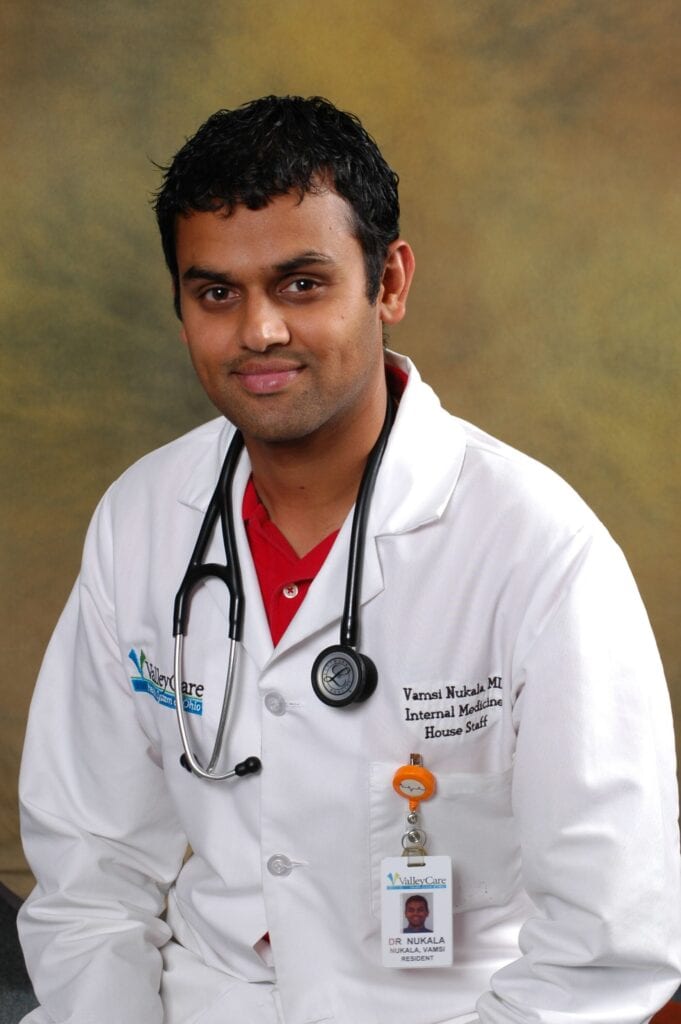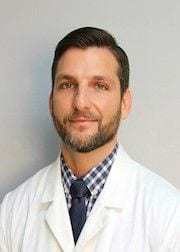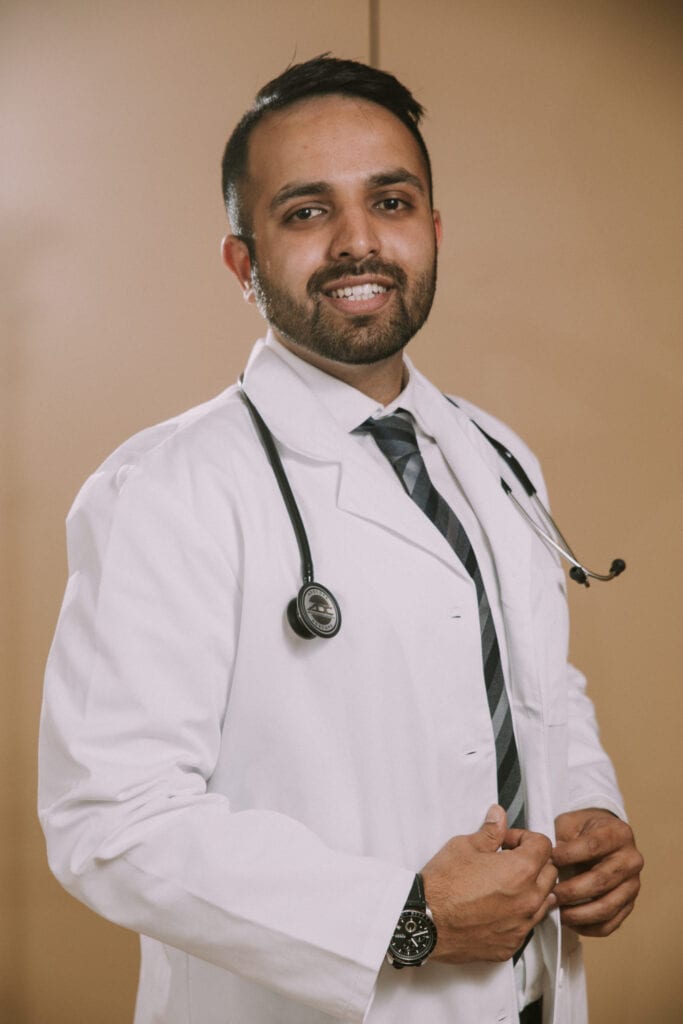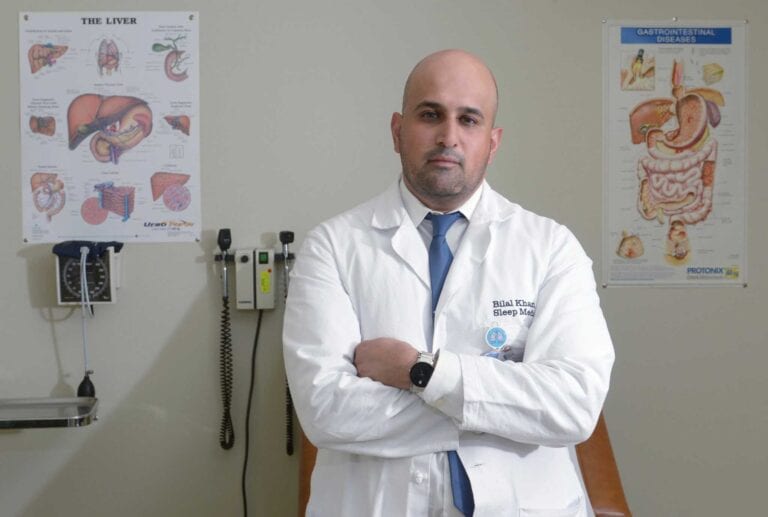As the COVID-19 pandemic surges through the world, citizens are looking for ways to cope with fear and uncertainty, protect their loved ones, and forge ahead. Many of those working on the front lines in healthcare fields are boldly risking their own health and safety to help care for others in this fight against an invisible virus.
Many of those fighting on the front lines are AUA alumni, who have worked tirelessly to earn their degrees and demonstrate their skills. This pandemic has challenged alumni to put their best skills to work as they race to help flatten the curve against the novel coronavirus. One AUA alumnus, Dr. Vamsi Nukala, is still working with primary care patients in Southern Illinois despite the inherent risks and explains how his practice has changed in the last few weeks:

Vamsi Nukala
Class of 2012
I am currently practicing in Maryville, IL, which is just outside of St. Louis. I am out-patient primary care and usually see many patients a day with a wide range of medical problems.
Since the surge of COVID-19 has hit the Midwest, we have had to change our practice considerably. We are revamping how we do medicine to protect our patients, staff and ourselves. We are having to learn a whole new way to treat patients by telephone visits as well as video visits. We are still seeing select patients in the office who absolutely must be seen, but that is on a very limited basis.
We also set forth a screening phone call for patients. Using this screening process, I have diagnosed a few already and was able to get them directed to the testing and treated/admitted as needed. The hospital is currently doing something similar and only admitting patients when absolutely necessary. Everyone is on high alert and we must treat every person as if they have the virus.
As our practice has changed, we are also ready at any time to be called into the hospital to care for the inpatients as well. This is something that is usually not necessary as they have their own Hospitalists. However, we have to be flexible during this time and willing to help the patients regardless of how medicine has had to currently adapt.
Other alumni are working behind the scenes, yet still helping in a very direct way with diagnosis and discovery. Dr. Chase Parsons, a resident in diagnostic radiology, credits AUA with preparing him to effectively handle the current pandemic:

Chase Parsons
Radiology, Class of 2012
It has been reported that South Florida accounts for the majority of all positive COVID-19 cases in Florida. As a radiology resident in Miami, we are seeing several new cases every day, primarily using CT scans of the chest.
Although not on the immediate frontline per se, we as radiologists are helping do our part behind the scenes by helping to diagnose and stratify patients.
As you’ve probably heard in the news, early on (and even now in some places) we did not have nearly enough tests, and the tests that we did have took several days to get results. Because of this, chest CT is a vital component in the diagnostic algorithm for patients with suspected COVID-19 infection.
While CT is helpful to screen potential patients, you can also use it to get a sense of the stage and timing of the disease. CT can also indicate specific high-risk findings that indicate poor outcome and increased mortality. These patients are more likely to crash and need ventilation, thereby requiring admission and ICU care from the start. Developing a better sense of these findings, along with their outcomes, may also help determine who gets and benefits most from any treatment, especially if and when resources become scarce.
Among other things, AUA taught me the importance of staying up to date with the most recent medical literature, which has proven invaluable during the current pandemic.
In addition to caring for patients’ physical health, many doctors are working to care for patients’ mental health. Dr. Ayoosh Kakkar, describes his work in the field of psychiatry conducting telehealth screenings and how AUA prepared him for this experience:

Ayoosh Kakkar
Psychiatry, Class of 2016
I went to AUA from 2010 to 2012, and after that I went for my clinical rotations in Atlanta, Georgia, Chicago, and New York. I quickly became accustomed to the South, and I decided that Augusta would be my best option because I wanted to be at a larger university for my residency. That’s a big part of your training, because that’s where you really get to experience how other services work. You can learn how to work in a larger group setting in dealing with more complex scenarios.
AUA did an excellent job preparing me throughout medical school. From the way they organized their lectures to the availability of all the attendings, it made for a great learning environment at the university. AUA had the right facilities for anatomy labs and simulated clinical labs, so bringing that into the actual clinical fields was quite smooth. Besides the theoretical knowledge that we received while on the island, the rotations were set up well and we were held accountable during these rotations for the shelf exams that really helped prepare you for both the theoretical and the clinical side. The sites the program chooses are a lot of the larger, university-based sites or large hospitals with diverse clinics, so we’re able to have exposure to busier schedules and how to work during a situation like the pandemic.
This is new – it’s a change for everybody. But it’s a change that we’ve all been waiting for in the medical fields to show how hard we work the day-to-day services. When it’s time to get up and perform on the larger stage, we’re able to do that. AUA teaches you perseverance – keep pushing on and keep going forward; do that throughout your medical career, because with your experiences in the Caribbean and the USA, you’re already set to work hard. You’ve already been training yourself, so this is the time for you to show it.
There are some residents from AUA who are right on the field who are working in medicine, and they’re doing an excellent job. It’s busy because, not only are we dealing with the pandemic, but we’re still dealing with chronic medical problems that people come to the hospital for otherwise. What’s going to come after this is the larger picture for us. There are jobs, families, and individuals that are affected – this goes larger than just a pandemic; there’s going to be an aftermath of this. I hope it’s talked about, and I hope we can raise awareness, because so many small businesses and families are being affected by this, so there’s going to be a setback after.
This is the time for those who are interested in healthcare to get involved – healthcare workers are much appreciated during a time like this. It’s not just the students that went in – the MDs, DOs, PT techs, therapists – all the healthcare workers are coming down to get involved. It’s wonderful to see a community come together and be fighting together. 2020 didn’t have the best start, but it’s kind of woken everyone’s eyes and made us realize what’s important.
Many other AUA alumni are working directly on the front lines of the pandemic in critical care units and hospitals across the country. Dr. Bilal Khan shares how preparation for the pandemic started many years ago at AUA and what it’s like now working directly with patients who are battling this disease:

Bilal Khan
Internal Medicine, Class of 2011
I started AUA a while ago. I’m one of the old school guys that started back before the new campus was built and they were on this small street called Fryersville Road. One of the things that AUA always did is put me in leadership roles. On the island, when I had ideas, they would say, “Okay, we’ll support you. Why don’t you execute it – come up with a plan and a team.” I was able to do those things at a very early stage, even before I had all the tools to go practice medicine.
Doing that early sticks with you; I ended up the chief resident in my residency, mainly because of that. I got my fellowship and completed my training in internal medicine, pulmonary care, and sleep medicine. Right now, given the current situation, the big need is in critical care, so I help run the ICU at my hospital in New Jersey. I never lose sight of the fact that, without AUA giving me the opportunity, I wouldn’t be here and be able to care for my patients.
We’ve had over fifty patients test positive for Coronavirus, and many of the tests are still pending, so our numbers are probably much higher than that. In my unit, we have about 16 ventilated patients right now that I’m taking care of, and there are several others that are borderline.
Right now, where we are in this world, we’re not talking about reinventing the wheel – we’re actually inventing the wheel because we’ve never dealt with a crisis like this or a virus like this, so everything is new. We’re learning how to put two people on one ventilator and use other protocols that we’ve never had to put in place.
This is an unprecedented time in America. I’ve had a lot of opportunity to take on leadership roles and put my ideas forward, but that doesn’t start today. That’s because I was trained that way from the beginning when I started medical school. AUA always gave me that platform if I wanted it to take on those opportunities of leadership.
I tell my medical students now – “One day, you wrote a long essay about how you want to help people and save people. This is your opportunity more than you may ever have in your entire career to do that. The world needs you, and you can make a difference. This is that time.”
Healthcare workers are in high demand and likely will be for quite some time. If you’d like to join other AUA alumni from across the globe in making a difference in the fight against COVID-19, explore our site for more details on our programs and registration.
